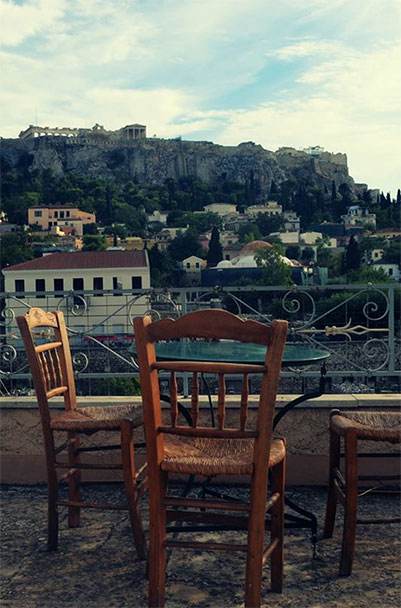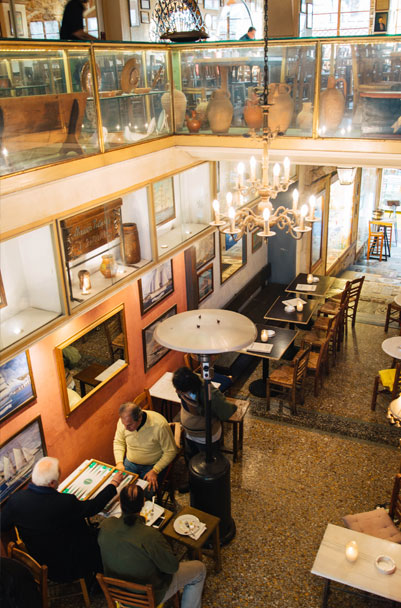Coffee and Politics: A Greek Tales 150 years old

As strange as it may seem, coffee for years in Greece has gone hand in hand with politics - around a cup of coffee have become the most critical political debates.
The habit of coffee came to Greece during the Ottoman domination, as well as in all the states whose territories were part of the Ottoman Empire. With the liberation of Greece and the creation of the modern Greek state, coffee shops are modernized and Europeanized. Since the early years of the Greek Kingdom, coffee and politics have gone hand in hand. This is mainly due to the fact that cafes were the most important meeting and socialization points, the places where the city's residents met all day long, and the political debates were blurred. We are making a small overview of the tight embrace of politics and coffee by taking a short walk to some of the lesser or better known cafes of Greece and Athens.
 "Bella Grecia": The coffee shop that overthrown a king
"Bella Grecia": The coffee shop that overthrown a king
One of the first Athenian cafes with European atmosphere, "Bellla Grecia", opened in mid-19th century at the junction of Eolou and Ermou streets. The "Bella Grecia" was known for its excellent coffee, as its "tampides", the barists of that era, knew 48 variations of Greek coffee. But it has remained in history as the first, perhaps, "political" coffe shop.
"Bella Grecia" offered newspapers, which fueled political debates. Often, candidates or even acting deputies sent their people there to hide the talks and catch up with the political climate. Leaflet of 1863 features the cafeteria "Central Administration of the Church of the People, where ministers and kings are judged". Too many protests had as their starting point or as a result "Bella Grecia", the most important being the mobilization for the eviction of the first king of Greece, Otto of Bavaria, who grew up on the tables of "Bella Grecia". "Bella Grecia" will inaugurate a political climate that will remain dominant in Greek coffee shops for many, many years.
The "real parliament" : Zacharatos coffee shop in Sintagma Square
From the late 19th century until the middle of the 20th century, one was the coffee shop that monopolized the political life of the capital: the famous Zacharatos. Large, spacious and luxurious, with an enormous variety of coffees and sweets for the time, Zacharatos' coffee shop was the very place of political debate and fermentation, as it was strategically located just opposite the Hellenic Parliament in Syntagma Square. Ministers, parliament officials, and parliamentary editors of the time are reading their reports on his benches before handing them over to their newspapers. Such was the atmosphere that prevailed, which Georgios Papandreou described as "a second parliament more free from the real". Often, the political talk about the cups of coffee resulted in intense disputes, which rarely exceeded the limits, thanks to the secular and comme il fault character of the Zacharatos cofffe shop.
 Disputes over a cup of coffee
Disputes over a cup of coffee
The division that characterized the Greek political scene took a number of appearances over the years that passed and of course did not leave an important aspect of the everyday life of the Greeks, coffee, unaffected. In cafes, gatherings, discussions and social gatherings, debates have faded, which often resulted in quarrels and often serious incidents that led to the creation of "separate" cafes.
At the beginning of the twentieth century, the Athenians are divided into Monarchists and Venizelists and their cafes are the same. At the beginning of Panepistimiou Street, near Syntagma Square, two cafes, "Giannaki" and "Dore" become the hot spots of the two factions. The hotheads of both sides do not fail to express their anger often by breaking down the "opponents" coffee shop, when the political climate was getting stronger.
This informal segregation of cafes will remain dominant for many years, both in the Athenian neighborhoods and, most importantly, in the towns and villages of the province. For many years, the cafes were separated, with the patrons belonging to a particular political area, as avoiding the quarrels. This habit has been preserved until recently, as in "small" towns there were "blue", "green" and "red" cafes until a few years ago, until the mitigation of political passions and the fact that the cafes changed their faces and were modernized the dividing lines. It is worth noting that in order to avoid episodes and quarrels, drinking alcohol was banned by law both on election day and one day before. Nobody, fortunately, ever thought of banning coffee too - the episodes might have been bigger then!
Nowadays, cafeterias remain the main pillar of the Greek social life and the coffee culture we have as a people continues to provide a basis for long stays in the cafeteria chairs. However, the political passions are not as intense as they used to be, the cafes have not been an exclusive male presence for many years, and any political discussions, if they happen, are part of the general, everyday dialogue. Political cafes and their atmospheres belong exclusively to the past.










